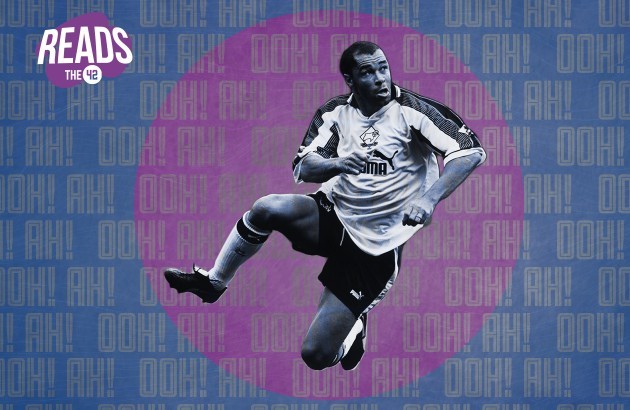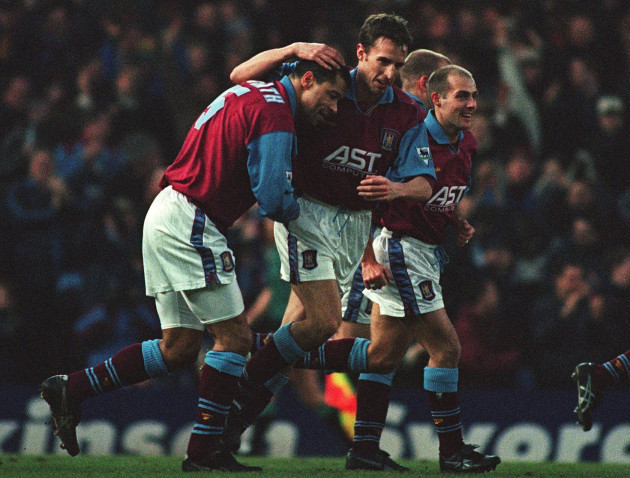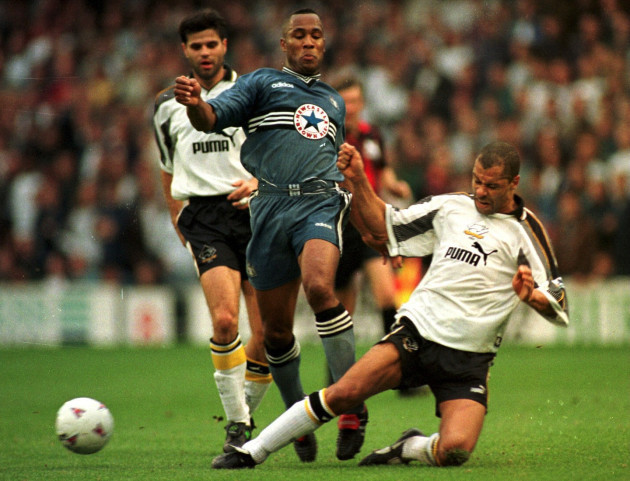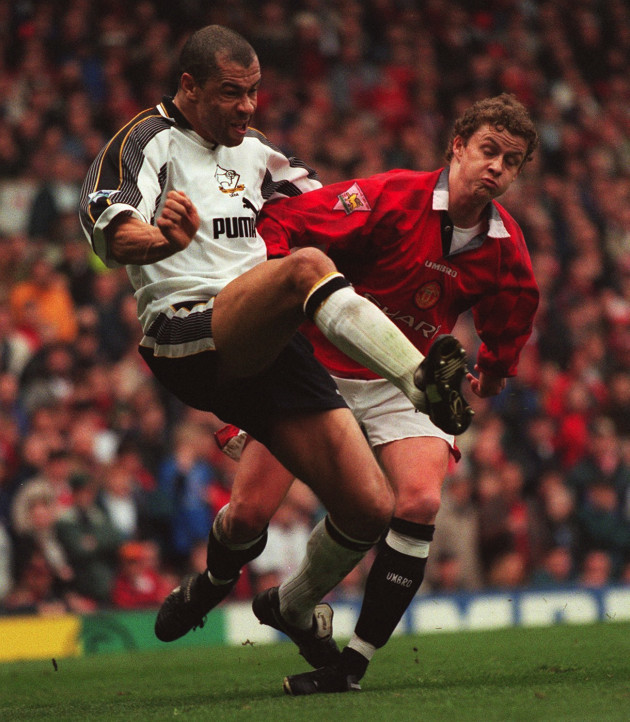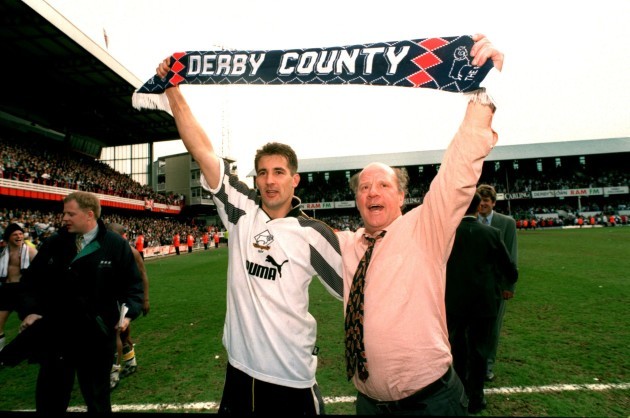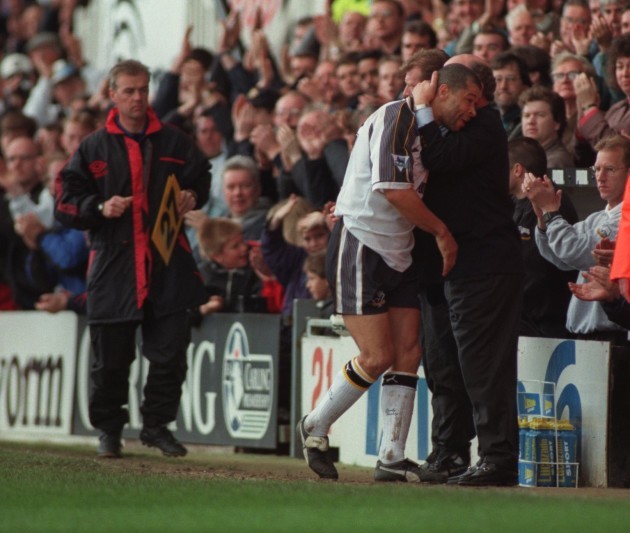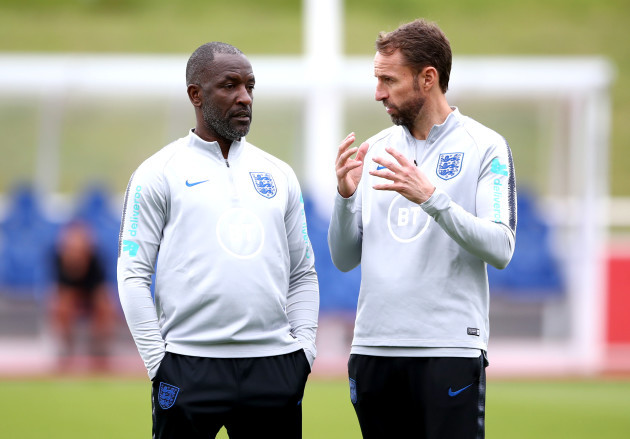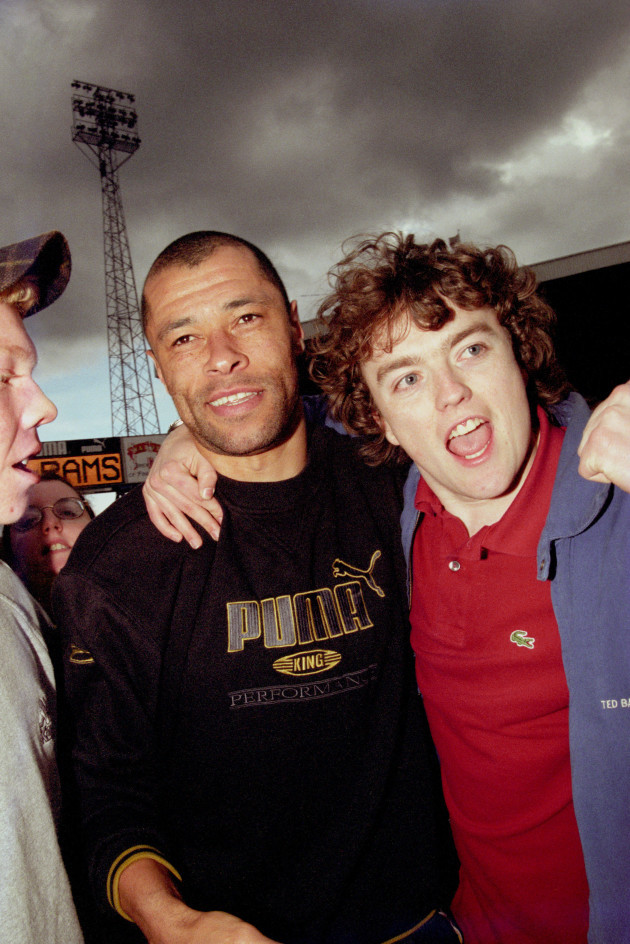HE WAS APPROACHING his 37th birthday.
He hadn’t played a Premier League game in six months.
He was plagued by severe pain in his rapidly deteriorating knees that had prevented him from training properly for years.
And he was tasked with policing the world’s most expensive footballer.
But Paul McGrath was a man to whom the conventions of football had long since surrendered.
Alan Shearer was at the peak of his powers, yet for the vast majority of his first outing with newly-promoted Derby County, McGrath had the Newcastle United star “trapped like a wasp in a jam jar” according to Phil Shaw, who was reporting for the Independent at the Baseball Ground on the afternoon of Saturday, 12 October, 1996.
McGrath had only met his new team-mates for the first time 24 hours earlier, which didn’t deter Derby manager Jim Smith from putting him straight into his starting line-up.
“We trained very hard every day,” says Chris Powell, who excelled in a left-wing-back role for Derby throughout the 1996-97 Premier League season. “With a manager like the late, great Jim Smith, it was always full throttle.
“On his first day, Paul was there but he didn’t join in with anything – he just jogged around the pitch a few times at a really slow pace.
“Jim used to leave the training to Steve McClaren, but when he looked out the window and saw Paul jogging on his own, he came straight out. Jim was combustible at the best of times and he started going mad, effing and blinding. He said: ‘Paul, why aren’t you training?’
“And Paul just replied: ‘Boss, I don’t train on Thursdays and Fridays, I just play on Saturday.’
- For more great storytelling and analysis from our award-winning journalists, join the club at The42 Membership today. Click here to find out more >
“If any other player had said that to Jim, he would have ripped our throats out, he would have gone ballistic, but with Paul he just went: ‘Okay, Paul. No problem.’
“Because of his knees, all Paul needed was massaging and a bit of light work. Sure enough, he went out the next day and put on an absolute masterclass.”
The previous season had been McGrath’s seventh at Aston Villa. It was also one of his most successful, as they finished fourth in the Premier League to qualify for the Uefa Cup.
With McGrath the central pillar in a formidable defensive triumvirate that also included Gareth Southgate and the late Ugo Ehiogu, Villa matched champions Manchester United for goals conceded. A defeat to Liverpool cost them a place in the FA Cup final, but silverware had already been attained via the League Cup.
Signs that McGrath, aged 36, was struggling with the demands of the game at the highest level were scarce. The match report carried in the Irish Times the morning after the Coca-Cola Cup decider noted that “Tony Yeboah appeared in danger of vanishing inside Paul McGrath’s pocket” during Villa’s 3-0 win over Leeds United.
Earlier in his career at Villa Park, McGrath’s personal circumstances had been met with empathy by two of his former managers, Graham Taylor and Ron Atkinson, both of whom were satisfied to make considerable allowances for the knee issues that required meticulous management.
His involvement in training was subsequently limited, but the dividends were paid on a Saturday afternoon. Although the approach was decidedly unorthodox, McGrath had demonstrated its effectiveness for years – never more so than in 1992-93, when he was conferred as the best footballer in the English game by his winning of the PFA Player of the Year award.
McGrath’s absence from the training ground didn’t sit quite as easily with Brian Little, who replaced Atkinson in November 1994. Little’s plans to build a Villa team for the future, which would naturally be backboned by younger players, didn’t bode well for a veteran who spent more time working with the physio than the coaching staff.
He nevertheless remained a regular fixture in the team until the end of the 1995-96 season, and was even rewarded with a contract extension. McGrath committed to another season at Villa Park, despite fielding a variety of different offers from elsewhere.
John Aldridge, following his recent appointment as player-manager at Tranmere Rovers, tried to coax him down to the First Division. Another former team-mate, Frank Stapleton, was in touch from the USA, where he was in charge of New England Revolution. There was also an approach from Japanese club Shimizu S-Pulse, who were under the management of 1978 World Cup winner Ossie Ardiles.
McGrath signed his new Aston Villa deal in May 1996, but the next time he played in a Premier League game involving the club it was as a member of the opposition. For the start of the 96-97 campaign, Southgate and Ehiogu were again joined in the Villa defence by an Irishman. Instead of McGrath, however, it was Steve Staunton.
Conscious that his body would be unable to repel the looming threat of retirement for much longer, McGrath was understandably reluctant to be restricted to the role of a spectator for the final days of his playing career.
His transfer request was accepted, although he was initially angered by the club’s valuation of him at £200,000. McGrath felt it was excessive, given his age, but Jim Smith didn’t. As Derby County midfielder Robin van der Laan would later remark: “He’s still class. The bargain capture of the season.”
Twenty-five years since he left the club, McGrath is still revered at Aston Villa. Click on one of his social media posts and you won’t need to scroll far to find a Villa fan reminding him that he’s still known as “God” to the claret-and-blue cohort in Birmingham.
Derby supporters, on the other hand, initially feared that their club had signed an ailing centre-back in search of one last pay-day. His best days were indeed behind him, but McGrath didn’t take long to show that there were still a few more good ones to come.
“Myself and the other players, we were gobsmacked when we heard that we’d signed him,” says Chris Powell. “It actually put us on the map in the Premier League, the fact that we attracted a player of his calibre.
“We were a young and hungry squad who had just been promoted to the big league, but Jim Smith felt we needed something extra. Managers will sometimes be in a position where there’s something missing and they’re not sure what it is. Paul was what we were missing.
“He had such an impact, not only on me personally, but I think the whole squad. He made a massive difference. He was a great guy too, very unassuming, and he fitted in straight away.
“I mean, he was an enigma. We’d be training really hard all week and then Paul would turn up on a Friday. He’d jog around the pitch, have a massage, he might have something to eat or he might shoot off, and then the next time you’d see him would be at 1.30pm in the dressing room on the day of a game.
“He’d have done no tactical work – someone else would take his place for that – but he would just come in and perform, every single week. I don’t know how he did it, but he was just outstanding.”
Steve Nicholson, chief football writer for the Derby Telegraph, says: “His performances on the pitch spoke for themselves. McGrath knew what he had to do to be ready for games, he knew his body.”
At St James’ Park in the autumn of 1996, Newcastle United dismantled Manchester United en route to a resounding 5-0 victory that sent them three points clear at the top. A week earlier, Kevin Keegan’s side encountered much more stubborn resistance in Derby.
To Alan Shearer’s credit, when a chance presented itself he capitalised. Philippe Albert fluffed his attempt to get a head to John Beresford’s free-kick, which deceived the Derby defence. The ball fell kindly for Shearer, and he applied the type of emphatic finish that had become synonymous with the £15million striker.
The 76th-minute volley was one of 25 Premier League goals scored that season by Newcastle’s big-money signing, who was also courted by Real Madrid and Manchester United after winning the Golden Boot at Euro 96 a few months earlier.
Beaten 0-1, Derby dropped a point, but McGrath had made his: not only could he still survive in the Premier League, he could thrive. It was a point he’d emphasise repeatedly over the course of the next seven months.
“For all but a few fateful seconds, Paul McGrath rolled back the years to blot out Alan Shearer,” Phil Shaw added in his account of the game. “Derby’s veteran debutant was the chief rival to Peter Beardsley, 35, for the accolade of man of the match. McGrath, he of the immaculate interception and the nonagenarian knees, obscured Shearer to the point where the England captain looked a fractious mediocrity.”
There was already a solid foundation in place when McGrath linked up with Derby, as evidenced by the encouraging start to life in the Premier League that the Rams made prior to his arrival. In addition to wins against Blackburn Rovers and Sunderland, they took points from Manchester United, Tottenham Hotspur and Leeds United.
He joined a squad that included Croatian duo Igor Stimac and Aljosa Asanovic, who became World Cup semi-finalists in 1998. Dean Sturridge hit double figures in his first season as a Premier League striker. Chris Powell went on to win five senior caps for England. The signing of a player of McGrath’s stature was significant nonetheless.
“He’s still Mr Fantastic,” Jim Smith said of McGrath after Derby came from behind to earn a draw away to West Ham United on 23 November. “With his knees and at his age, we still don’t know how he does it, but there is nobody better at reading a game than big Paul.
“He can’t train all that much and a day before the game I didn’t think he’d be able to play because one of those knees just gave way on him as he was walking. But he went out there and turned it on as good as usual.”
McGrath’s aptitude for the game had always served him well, but particularly so during the winter of his career. Physical limitations were often overridden by his ability to compute what was about to unfold in the heat of battle.
“He’s one of my favourite Rams players,” says Derby County fan Chris Page. “What sticks in my memory is the effortless positioning and confidence. He understood what was happening in a game quicker than any other player I’ve seen in a Rams shirt. He just instinctively knew where to be.”
Chris Powell, who’s now a member of the England coaching staff under Gareth Southgate, adds: “Paul taught me a lot, especially with his calmness. I was a calm player anyway, but positionally where he was at, how he read the play, I think it rubbed off on myself and a lot of the other players. It really helped us to grow.”
One of McGrath’s earliest appearances for Derby saw him come up against one of his former Manchester United team-mates, Gordon Strachan, who was manager of Coventry City.
“Paul is a walking miracle – he has baffled scientists, specialists, sports psychologists, nutritionists,” Strachan said in advance of the game.
“You can rip all the books up when you are talking about Paul McGrath. He defies everything because he has that great determination to play football and has skill in abundance. He is still a good friend of mine, a world-class player, but I hope he has a stinker tomorrow.”
Unfortunately for Strachan, McGrath was unable to oblige. He delivered “another fantastic performance”, in the words of Jim Smith, in a 2-1 win for Derby.
Although his new team-mates were aware of the issues McGrath had faced, his struggles with addiction didn’t permeate. The Paul McGrath they encountered was simply a humble peer who wanted to play; a giant of the game who shirked the hubris of superstardom that he was entitled to; a man who made them better.
“Regardless of what might have been happening for him off the field, when his contemporaries looked at Paul, they just saw one of the game’s great players,” Chris Powell says.
“We’re talking about a Rolls Royce of a centre-back. You can only imagine what he’d be worth if he was playing nowadays. We talk about Virgil van Dijk at Liverpool and how great he’s been, but for me, Paul would go past any centre-backs who are playing now. I truly believe that.”
Even in the rare instances when McGrath was guilty of an error, he was quick to rectify, as Efan Ekoku discovered to his cost during a 1-1 draw between Wimbledon and Derby at Selhurst Park.
“Gerald Mortimer, who passed away in December 2013, was the former Derby County writer for the Derby Telegraph and he would often recall that game,” Steve Nicholson explains.
“McGrath hit a poor pass across the face of the area to put Ekoku clear on goal. McGrath realised what he had done and, with a burst of pace that would have been astonishing even for a player at the peak of fitness, ran back and past Ekoku to recover the ball and prevent Derby conceding what looked to be a certain goal.”
As noted by Keith Pike in his report on the game for the Independent: “Composure is an effective response, and in the ageing, remarkable Paul McGrath, Derby had the perfect weapon.”
The 1996-97 season was punctuated by notable results for Derby County, among them a 3-2 win away to Manchester United which is best remembered for the brilliant solo goal scored for the visitors by Costa Rican debutant Paolo Wanchope. Alex Ferguson – who sold him in 1989 – later credited McGrath with a man-of-the-match display.
However, of particular pertinence to McGrath during his season at Derby were two fixtures against Aston Villa. He admitted to experiencing contrasting emotions after a 3-1 home win that sent Derby into the FA Cup fifth round at his former club’s expense.
That the travelling Villa supporters chanted his name both before and after the game was an early indication of an unyielding level of affection for the man that has stood the test of time.
“Paul is remarkable,” Jim Smith said afterwards. “If we could get him new knees I think he would go on forever. His experience and ability have been invaluable in the way that he’s held the defence together at times.
“He’s a brilliant person to have around the club. He talks a lot to the young lads and we always say to them, ‘just watch him play’, because he’s been outstanding.”
After another victory against Villa (2-1) at the Baseball Ground on 12 April, 1997, Smith finally accepted that Derby – with four games still to play – had done enough to secure their Premier League status for another year.
When they signed McGrath from Villa, it was on the basis that a fee of £100,000 would be doubled if relegation was avoided. In a post-match press briefing, Smith declared himself “delighted to cough up the money” before lauding McGrath for a “tremendous” performance.
While McGrath’s move to Derby had been an unqualified success, the physical toll of another season in the Premier League grew increasingly inhibitive as the frequency of games escalated towards the end of the campaign.
“I met Paul after one of the last games of that season and asked him if he’d be back again next season, because we needed him,” recalls Derby County supporter Mike Harris. “He just laughed and said: “Mate, I’d love to, but I’m fucked!’”
The aches in his knees were becoming harder for McGrath to ignore, and Jim Smith’s concerns over how much longer he could go on for were vindicated early in the 1997-98 season.
In the hope of prolonging his career, McGrath dropped down a level to join Sheffield United. After making 12 appearances, a man who was advised to hang up his boots while at Manchester United had eventually succumbed to retirement nearly a decade later.
“When he plays a match on Saturday, he can’t walk until Tuesday,” Smith said of McGrath, who won the last of his 83 Ireland caps in a February 1997 friendly against Wales in Cardiff that ended goalless.
“It is always difficult when you have a guy unable to train, in terms of when you are trying to work out patterns and set plays. But Paul has been a standard-bearer for us. He’s someone the lads have really looked up to.”
On the final day of the 1996-97 season, McGrath bid farewell to Derby County and the Premier League by playing against an Arsenal side who signed off on their first season under Arsene Wenger with a 3-1 win.
Derby’s last game at the Baseball Ground, their home for 101 years, before relocating to a new stadium at Pride Park ended in defeat, but 12th place was a highly creditable finish for a club that had been absent from the top tier of English football for five years.
“Paul McGrath only played 26 games and yet he made it into the club’s top 100 players in the publication ‘Derby County: The Complete Record’ by Gerald Mortimer,” says Steve Nicholson. “That tells you everything about the impact he made in his short time at the club. Derby fans loved him.”
Chris Powell says: “I won the club’s Player of the Year award that season, but when I was presented with it I actually dedicated it to Paul. I just felt that he had made me, and all the other players, want to go to another level.
“This was an iconic player who had been at the top level for a long time, and now he was playing with us. A lot of us hadn’t played at that level before, but there we were playing against the Manchester Uniteds, the Liverpools, and we were holding our own. Paul played a really big part in that.
“Jim Smith used to take us away to Blackpool for a few days and we wouldn’t train. We’d relax, go out, have dinner together, and everyone would just want to speak to Paul. It was always such a privilege to be with him.
“I loved the man. I still always look out for him if I ever hear his name on the radio or TV. I just hope that he’s well because he’s such a great man. He’s been through a lot in his life but he’s so well loved. I feel honoured to have played alongside him but also to have known the man. It was a great time in my career.”
Derby County fan Steve Kitson was 15 when he decided to reach out to McGrath to show his appreciation for his contribution to a successful first year in the Premier League.
“I wrote to him through the club at the end of that season just to thank him for helping to keep Derby up,” he says. “He sent me back a signed photo, which I still have. Like many others have said before, a class act.”
He’ll forever be God to followers of Aston Villa, but up the road in Derby, the season when they too worshipped at the altar of Paul McGrath won’t soon be forgotten.
For more great storytelling and analysis from our award-winning journalists, join the club at The42 Membership today. Click here to find out more >

